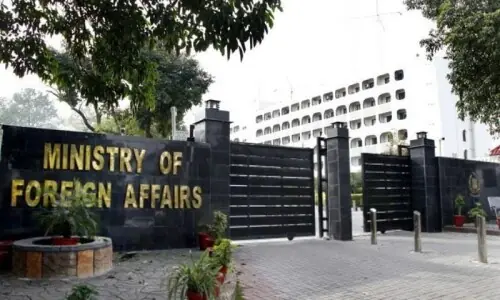KARACHI: Pakistan plans to borrow more than $4 billion from the Saudi-backed Islamic Development Bank (IsDB) as part of its attempts to restore dangerously low stocks of foreign currency, reported The Financial Times on Thursday.
Two officials told the daily that the Jeddah-based bank had agreed to make a formal offer to lend Islamabad the money when Imran Khan took over as prime minister. They added that they expected Asad Umar — Mr Khan’s proposed finance minister — to accept the offer.
See: Imran Khan and the IMF: Pakistan's bailout dilemma
“The paperwork is all in place,” said one senior adviser in Islamabad. “The IsDB is waiting for the elected government to take charge before giving their approval,” the report quoted the official as saying.
The official added that the loan would not cover Pakistan’s expected financing gap of at least $25bn during this financial year but was “an important contribution”.
Speaking to reporters in Islamabad this week, Mr Umar had warned: “The situation is dire. We’ve got 10bn dollars of central bank reserves, [and] we’ve got somewhere between $8bn and $9bn in short-term liabilities, and therefore your net reserves are close to nothing.”
As per the newspaper report, officials have already drawn up plans to borrow up to $12bn from the International Monetary Fund — though such a bailout is likely to come with strings attached, such as a demand to see the details behind billions of dollars’ worth of Chinese loans.
Mr Umar, it added, was therefore exploring what other options remained open to him, of which the IsDB loan was one. Officials said the loan would be used mainly to pay for oil imports, with higher crude prices having contributed to the country’s problems.
One official at Pakistan’s central bank — who has been involved in negotiations with the IsDB — said the loan had the backing of the Saudi government, “which wants to play a part in rescuing Pakistan from its present crisis”.
Despite the promise of money from the IsDB, economists warn that Mr Khan’s government will still have to enact potentially unpopular spending cuts and tax rises to help repair the government’s balance sheet.
“The budget deficit shot up to about 7 per cent of gross domestic product during the last financial year,” Waqar Masood Khan, a former finance ministry official told FT. “Bringing that down to the target of 4 per cent is not going to be easy,” the report added, quoting the official.
Published in Dawn, August 10th, 2018

































